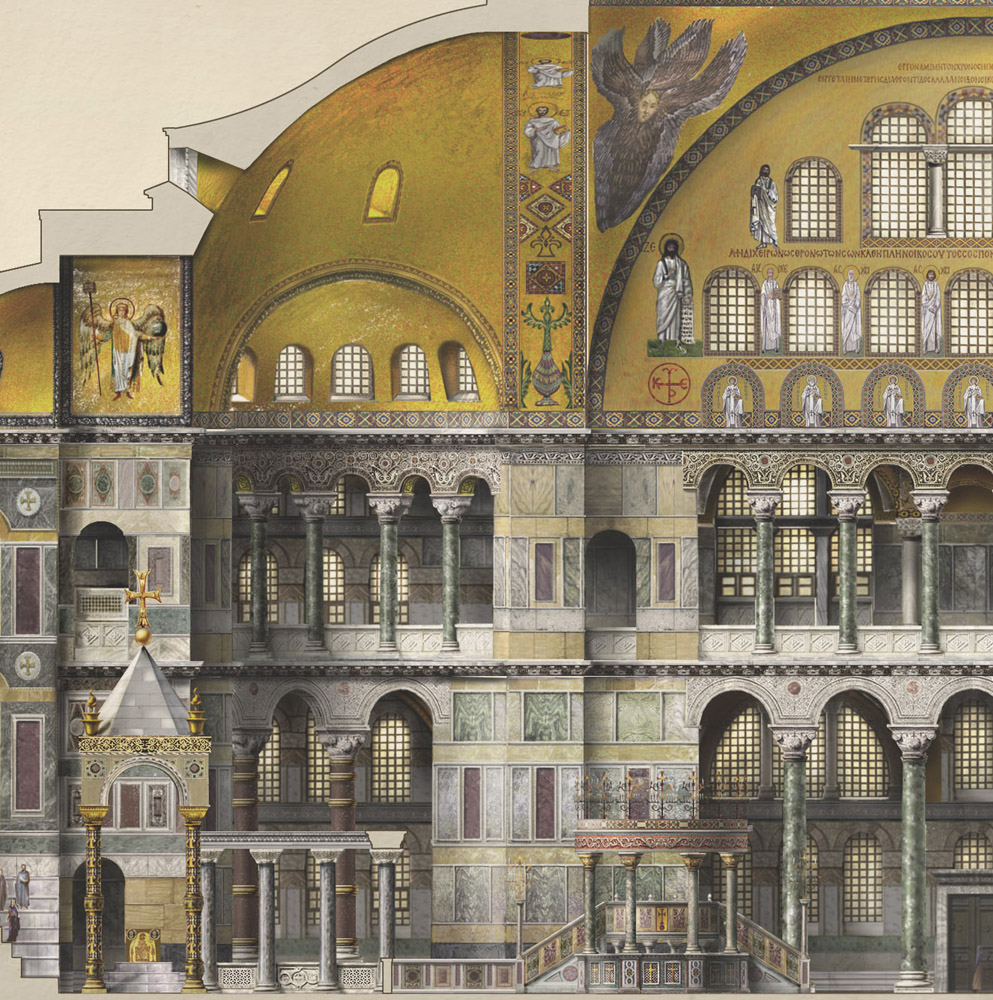 For fifty-seven years the metropolis of the East remained in the power of the Western knights, but our Empresses have already come so frequently from the West that we shall not be tempted to expect a new or higher type of woman on the throne at Constantinople during the Latin occupation. That half-century may, indeed, be dismissed in a few lines as far as the purpose of this work is concerned. We saw that Baldwin, Count of Flanders, was selected by the Venetians and Crusaders to fill the throne. The Blachernæ and Bucoleon palaces were placed at his disposal, and one-fourth of the old Empire was assigned for his immediate rule. But Baldwin’s wife, Mary, daughter of the Count of Champagne, did not live to adorn herself with such remnants of the imperial finery as were still to be found in the palaces. Baldwin had left her in Flanders, and, when she at length attempted to join her high-minded husband in his new dignity, she died at Acre, on the journey.
For fifty-seven years the metropolis of the East remained in the power of the Western knights, but our Empresses have already come so frequently from the West that we shall not be tempted to expect a new or higher type of woman on the throne at Constantinople during the Latin occupation. That half-century may, indeed, be dismissed in a few lines as far as the purpose of this work is concerned. We saw that Baldwin, Count of Flanders, was selected by the Venetians and Crusaders to fill the throne. The Blachernæ and Bucoleon palaces were placed at his disposal, and one-fourth of the old Empire was assigned for his immediate rule. But Baldwin’s wife, Mary, daughter of the Count of Champagne, did not live to adorn herself with such remnants of the imperial finery as were still to be found in the palaces. Baldwin had left her in Flanders, and, when she at length attempted to join her high-minded husband in his new dignity, she died at Acre, on the journey.
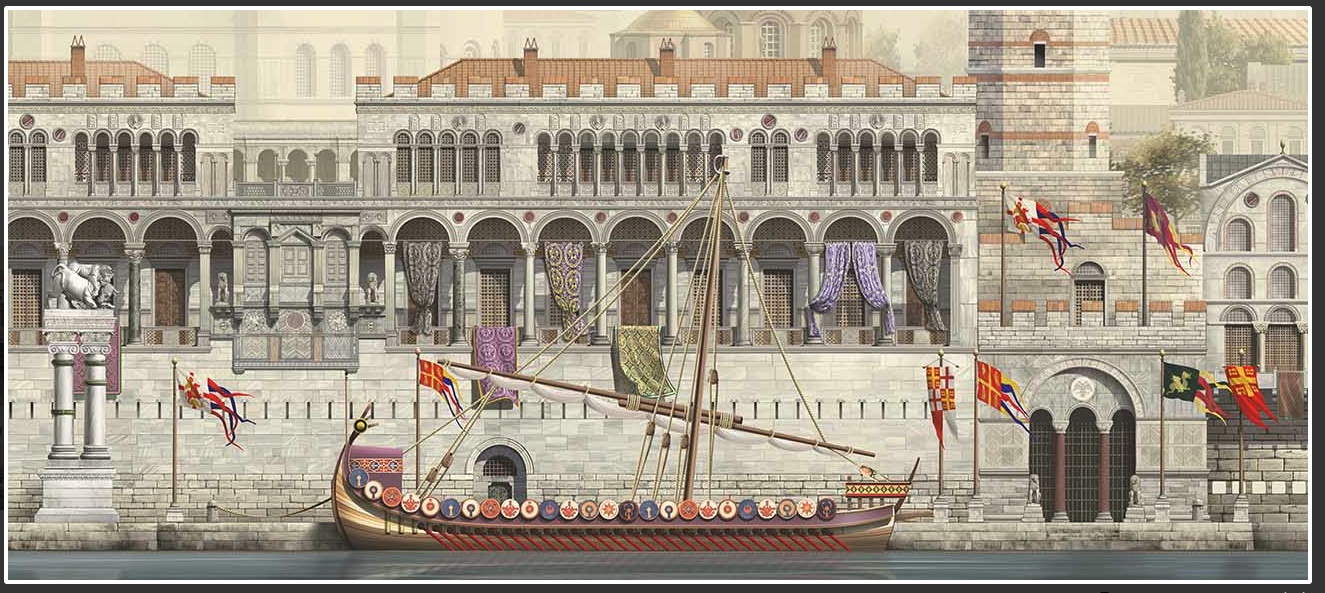 Baldwin himself was captured a few years later by the Bulgarians, and died in prison. His brother Henry, who succeeded him, married the daughter of Boniface, the King of Saloniki, whose adventures we have described. Agnes was, of course, not the daughter of the ex-Empress Maria, but of an earlier wife. She was summoned from Lombardy, married to Henry on 4th February 1207 in St Sophia, and the marriage day ended with a great banquet in the Bucoleon palace, in the older Byzantine fashion. But that is all we know of the Empress Agnes. Henry died in 1216, and his sister258 Yolande became Empress. Even of Yolande, however, the very scanty chronicles furnish a very poor portrait. Her husband, Peter of Courtenay, was, after being crowned at Rome by the Pope, arrested in Epirus, through which he had foolishly endeavoured to cut his way, and died in prison. As regent for her children Yolande remains almost imperceptible, and an anecdote of the reign of her son Robert is all that need be given to illustrate the character of the new dynasty. Robert, who had a light idea of chivalry, brought into his palace, as mistress, the daughter of one of the Crusaders, and her mother. She had been betrothed to a Burgundian knight, and the embittered lover, supported by a few friends, forced his way into the palace, cut off the nose and lips of the faithless lady, and bore off her mother to be drowned in the Sea of Marmora.
Baldwin himself was captured a few years later by the Bulgarians, and died in prison. His brother Henry, who succeeded him, married the daughter of Boniface, the King of Saloniki, whose adventures we have described. Agnes was, of course, not the daughter of the ex-Empress Maria, but of an earlier wife. She was summoned from Lombardy, married to Henry on 4th February 1207 in St Sophia, and the marriage day ended with a great banquet in the Bucoleon palace, in the older Byzantine fashion. But that is all we know of the Empress Agnes. Henry died in 1216, and his sister258 Yolande became Empress. Even of Yolande, however, the very scanty chronicles furnish a very poor portrait. Her husband, Peter of Courtenay, was, after being crowned at Rome by the Pope, arrested in Epirus, through which he had foolishly endeavoured to cut his way, and died in prison. As regent for her children Yolande remains almost imperceptible, and an anecdote of the reign of her son Robert is all that need be given to illustrate the character of the new dynasty. Robert, who had a light idea of chivalry, brought into his palace, as mistress, the daughter of one of the Crusaders, and her mother. She had been betrothed to a Burgundian knight, and the embittered lover, supported by a few friends, forced his way into the palace, cut off the nose and lips of the faithless lady, and bore off her mother to be drowned in the Sea of Marmora.
As Robert’s brother was a mere boy, the King of Jerusalem, a worthy old man of eighty, was summoned to fill the throne for nine years, and then Baldwin II. entered upon his long and inglorious reign; of which we need only say that, in spite of his extreme liberality in selling, especially to St Louis of France, the valuable relics (the crown of thorns, the rod of Moses, etc.) which had accumulated in Constantinople, and in spite of all the efforts of the Pope to maintain the worthless monarch on his throne, and that throne subservient to the Vatican, the feeble and incompetent rule of the Latins sank lower and lower, until, in 1261, a regiment of Greeks put an end to it.
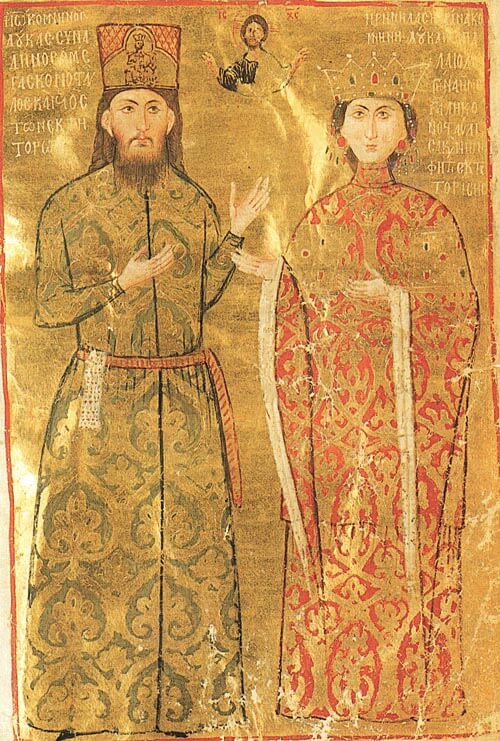 This slight account of the Latin rule at Constantinople will suffice to enable us to follow intelligently the fortunes of the descendants of the Byzantine monarchs who had set up a throne at Nicæa. Theodore Lascaris had married Alexis’s daughter Anna, who died early in the reign of her husband, and her two successors in his affection are even less known to us than she. The first was Philippa, daughter of the King of Armenia; but, after giving birth to a boy, Philippa was, for some259 unstated but imaginable reason, sent back to the ruder Court of her father, and Maria, daughter of Yolande of Constantinople, occupied her place. Maria died, childless, after a few years, and, when Theodore himself departed in 1222, his only son (the child of Philippa) was a boy of eight years. The Empire was, therefore, wisely entrusted to a powerful and distinguished noble, John Ducas Vatatzes, and we at length reach an Empress of distinct and admirable personality.
This slight account of the Latin rule at Constantinople will suffice to enable us to follow intelligently the fortunes of the descendants of the Byzantine monarchs who had set up a throne at Nicæa. Theodore Lascaris had married Alexis’s daughter Anna, who died early in the reign of her husband, and her two successors in his affection are even less known to us than she. The first was Philippa, daughter of the King of Armenia; but, after giving birth to a boy, Philippa was, for some259 unstated but imaginable reason, sent back to the ruder Court of her father, and Maria, daughter of Yolande of Constantinople, occupied her place. Maria died, childless, after a few years, and, when Theodore himself departed in 1222, his only son (the child of Philippa) was a boy of eight years. The Empire was, therefore, wisely entrusted to a powerful and distinguished noble, John Ducas Vatatzes, and we at length reach an Empress of distinct and admirable personality.
The Empress Irene, who, in the year 1222, ascended the throne with Vatatzes, was the eldest of the three daughters of Theodore Lascaris and Anna, and therefore a granddaughter of the Emperor Alexis and Euphrosyne. While the Princess Eudocia had inherited the character, or lack of character, of Alexis, her elder sister Anna had, as far as we can judge, shared the comparative sobriety of Euphrosyne, and Irene united in her person all the best features of the family, without its ancestral defects. She was prudent, equable, pious and virtuous. Her first husband, Andronicus Paleologus, died prematurely, and her father then united her to the able commander to whom he designed to confide the Empire.32 When Irene received her share of the imperial responsibility, she proved to be, says Ephrem, “a new Deborah,” and the few anecdotes preserved in regard to her suggest a sober and high-minded woman, associated in perfect harmony with (as long as she lived) a sober and high-minded and valiant husband. Unfortunately, Irene led so well-regulated a life during the twenty years in which she shared the rule of Vatatzes that there is little to record of her, and, however much we may resent it, we are dragged onward by the misguided chroniclers until we reach John’s later and less virtuous companions. But the contrast of this later period will be the more piquant,260 and the more honourable to Irene, if we dwell for a moment on the exemplary years that preceded it.
The greater part of John’s days were spent in warfare, but in the intervals of his wars he was attentive to the development of his little Empire, and in this he was finely supported by Irene. It is true that they adulterated the coinage, but that device had become a Byzantine tradition and we must set against it a large number of reforms. John was a just and simple-minded monarch. He developed his estates so industriously, in the periods of peace, that he at length relieved his subjects of the financial burden of royalty, and enabled them to prosper. The character of the Court is, perhaps, best seen, and attracts a lively admiration, in the following anecdote. One day John presented his consort with a modest jewelled coronet, and informed her, with pride, that it had been purchased by the profit on the eggs alone which his poultry farms yielded. He forbade his courtiers to wear Persian, or Syrian, or Italian silks, though they might wear the product of the silkworms of his own dominions, and he one day severely rebuked his son for going out to hunt in a tunic of cloth of gold.
Irene admired and encouraged this care for their subjects. Acropolites, our chief authority for the period, was a student attached to the Court at the time, and he gives high praise to the Empress. One day there was an eclipse of the sun, and Irene turned to the learned young man for an explanation. The work of the earlier Greeks was not yet entirely forgotten, and Acropolites was able to tell the Empress, with due modesty, that the body of the moon had passed before the face of the sun and momentarily cut off its light. But superstition was spreading its unhappy growth over the ruins of Greek culture, and other courtiers, especially the Empress’s physician, ridiculed the youth’s explanation. Irene laughingly told Acropolites that he was “a young fool”; but she regretted afterwards, in telling the matter to John, that she had used so arrogant an expression.261 Acropolites almost spoils the story by going on to tell us that, in his own conviction, the eclipse foreboded the death of the Empress, which occurred soon afterwards.
One other story confirms this excellent impression of the life of the Court in the palace at Nicæa, or in the country palaces at Nymphæum and Smyrna. Irene had one child, her son Theodore; an accident, as she rode to hunt and was thrown from her horse, prevented her from enlarging her family. When Theodore reached his twelfth year, the Emperor, who was himself over fifty, decided to marry him, and, as he was allied with the Bulgarians against the Latins, he sought the hand of a Bulgarian princess. The only available daughter of John Asan, the Bulgarian king, was a girl of tender years named Helen, and, though the marriage ceremony was performed, the two children lived together only as children under the watchful eye of Irene. The Bulgarian king at length repented of his alliance, and begged that the little Helen, now ten years old, might return for a visit to her parents. Vatatzes and Irene concluded at once that this was only a preliminary to breaking the alliance, but they scorned to detain the child. We read that she wept bitterly at being separated from Irene. During the journey to her father’s capital she was so inconsolable, even when Asan took her on his own saddle, that the monarch lost his temper and slapped her face. Helen did in time return to her spouse, but she will have little interest for us.
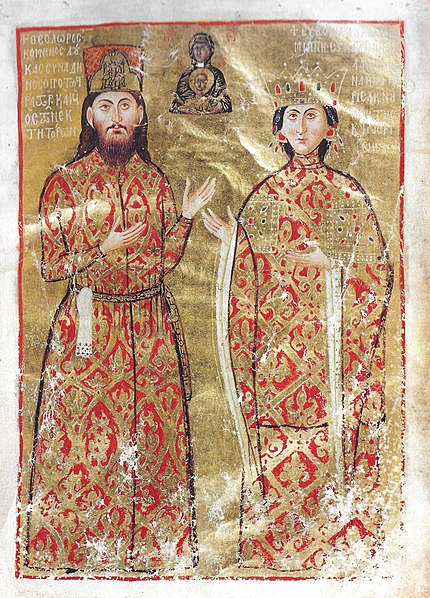 After nineteen years of this placid and useful co-operation with the Emperor, Irene passed away, and, after a decent interval of mourning, John Vatatzes, though now advanced in years, sought another Empress. He succeeded, in spite of the opposition of the papacy, in obtaining the hand of Anna, daughter of Frederick II., and sister of Manfred of Sicily. Anna was a pretty maiden of tender years, a mere symbol of alliance with the two powerful and independent monarchs I have named. John may have reflected that, as he had now entered his sixth decade of life, the immaturity of his bride would matter little. In the train of the young Empress, however, was an Italian marchioness whose eyes were, the chronicler says, “unescapable nets,” and John soon fell into them. Nicephorus says that the lady employed philtres and her fine Italian eyes in the conquest of the Emperor’s heart. We will be content to think that the eyes sufficed.
After nineteen years of this placid and useful co-operation with the Emperor, Irene passed away, and, after a decent interval of mourning, John Vatatzes, though now advanced in years, sought another Empress. He succeeded, in spite of the opposition of the papacy, in obtaining the hand of Anna, daughter of Frederick II., and sister of Manfred of Sicily. Anna was a pretty maiden of tender years, a mere symbol of alliance with the two powerful and independent monarchs I have named. John may have reflected that, as he had now entered his sixth decade of life, the immaturity of his bride would matter little. In the train of the young Empress, however, was an Italian marchioness whose eyes were, the chronicler says, “unescapable nets,” and John soon fell into them. Nicephorus says that the lady employed philtres and her fine Italian eyes in the conquest of the Emperor’s heart. We will be content to think that the eyes sufficed.
For the remaining decade of John’s reign the favoured marchioness was the most prominent figure at the Court. She did not, apparently, desire to interfere in politics. It was enough that she was permitted to wear purple slippers and other ensigns of royalty, and that courtiers should gather about her rather than attend the young Empress. It is related that she on one occasion went, decked in her imperial robes and accompanied by her glittering suite, to visit the famous chapel attached to one of the chief monasteries of Nicæa. The abbot of this monastery, Nicephorus Blemmydas, was tutor to Irene’s son Theodore, and, though we shall find his royal pupil affording little proof of the excellence of his education, the Abbot Nicephorus was a rare type among the degenerate clergy of the time. He shut the doors of the chapel and refused to admit the marchioness. Infuriated at the humiliation, and stimulated by her followers, she begged John to punish the abbot. John refused, and tearfully admitted that his own weakness was the proper occasion of the trouble.
In 1254 the valiant Vatatzes bequeathed the crown to his son, and Anna and the marchioness made way for the Bulgarian princess, Helen. Anna seems to have remained attached to the Court, or in some mansion at Nicæa, and we shall meet her again. But Helen died in a year or two; her husband followed after a short and licentious reign of four years, and the relinquishment of the throne to a boy of tender years, their son John, opened the gates of the palace to a shrewd and unscrupulous adventurer and his wife.
One of the commanders of the troops under Vatatzes and Theodore was Michael Paleologus, a grandson of the Emperor Alexis’s daughter Irene. Bold and crafty, passionate, yet ever ready to stoop to lies and oaths to cover his ambition, sensible that he was one of the most capable men to undertake the government and that his grandfather had at one time been destined for the throne, Michael directed his steps toward the palace from early youth. In later years his favourite sister, Eulogia, who reared him, used to tell how, when nothing else would soothe the restless infant, she used to put him to sleep with the strange lullaby: “Hush, Emperor of the city. You will go in at the golden gate, and do such-and-such things.” She may have mentioned to him this almost miraculous inspiration when he came to years of discretion. By sobriety of life—apart from love affairs—and liberality to his friends and dependants, he won great popularity and early incurred suspicion. John Vatatzes, in his later years, summoned him to reply to a charge of treason, and said that he must purge himself by the ordeal: one of the enlightened practices which the Crusaders had introduced into the East. Michael glanced at the iron balls glowing in the fire, and protested that, although he was innocent of treason, he feared that so sinful a man as he could hardly hope to carry the red-hot globes with impunity. When a bishop, who stood by, rebuked his lack of faith in Providence, he shrewdly suggested that the bishop, being innocent, might take the balls from the fire with his hands and deliver them to him.
His wit and boldness disturbed the solemn Court, and, instead of losing his head or his eyes, he won the favour of John and married the Empress’s great-niece, Theodora. She was a daughter of John Ducas, a nephew of the Emperor, and had been left to his guardianship. Michael264 was then twenty-seven years old, and we cannot say if the young Theodora accompanied him in his new command of the troops. However that may be, he was again denounced, to the new Emperor Theodore, and compelled to take a particularly sonorous oath of fidelity to Theodore and his infant son. In two or three years he was recalled to Court to repeat his oath. His eldest sister Martha—sometimes also called Maria—had a charming daughter, whom the Emperor ordered to marry one of his servants. The young people had just succeeded in falling in love with each other when Theodore, who was now diseased and capricious, changed his mind, and ordered the girl to marry a noble of her own rank. It was reported to the Emperor after a time that this marriage was not consummated, and could not be, because Martha had vindictively laid on it a form of incantation known as “Venus’s knot.” Martha was put, naked, in a sack with a number of cats; the cats were pricked with pins in order to make them lacerate her; and the abominable Emperor sat by to interrogate her about her incantations. After this it was thought prudent to compel Michael to repeat his oath, which he did fluently, and the impenetrable geniality of his manner quite disarmed Theodore.
Theodore died soon afterwards, and his boy (variously described as six, eight and nine years old) was left to rule the Empire under the tutorship of the first minister, George Muzalon, and the patriarch. Not only Michael, but all the other commanders and nobles, had sworn heavily to respect this arrangement. But the body of Theodore had scarcely been interred before Michael began secretly to agitate and to bribe his colleagues. Muzalon was an upstart, not a noble by birth, and it was not difficult to cast on him the blame of the brutalities of Theodore’s later years. Three days after the burial of the Emperor, Muzalon and his brothers and a large company of nobles and noble ladies gathered in the royal monastery at Sosander, without the city, for a memorial265 service, when, in the midst of the chanting, the heavy and regular tread of soldiers was heard. A band of officers and men burst into the chapel, and, before the eyes of the shrieking dames and the horrified priests, cut Muzalon and his friends to pieces beside the altars. National catastrophe, it will be seen, had not chastened the Byzantine character.
From Constable of the Empire, Michael was now raised to the dignity of Despot, and became tutor of the young Emperor. Then a convenient coalition of Western powers against the Empire gave Michael’s friends the opportunity to suggest that the strong man ought to be associated with the boy in the supreme power. On New Year’s Day (1259) he was openly proclaimed Emperor. The patriarch almost alone professed some concern about the terrible oath they had all taken only four months before; Michael met his concern by giving him a written affidavit, sealed with ponderous oaths, that he would restore the full sovereignty to John VI. when he came of age, and would recognize no claim of his own heirs to power. It was therefore agreed that Michael and John should be crowned together. When, however, the hour of coronation arrived, John was not present to respond to the call of the patriarch, and Michael and Theodora alone received crowns. Michael had made a little arrangement with the bishops beforehand, and only one of the lords spiritual protested. The crowd may have murmured when, after the ceremony, they saw the boy, crownless, walking after the new Emperor and Empress, but a liberal shower of gold coin put an end to their scruples.
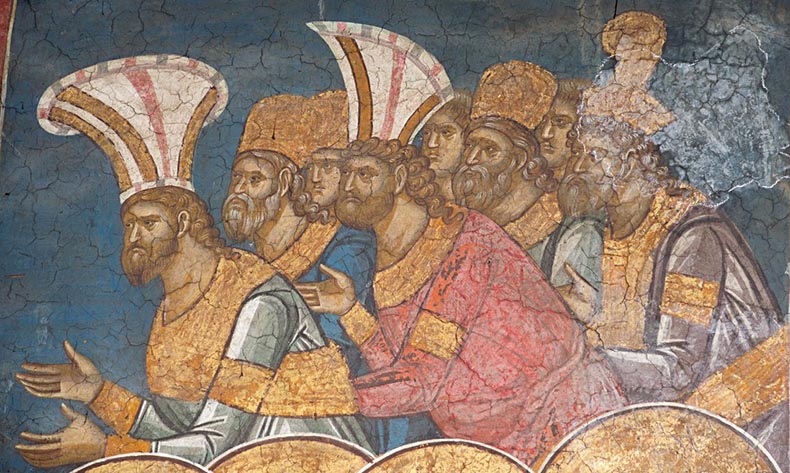 Such was the initiation to power and dignity of the Empress Theodora. Two other women, who will engage our attention, shared the elevation. These were Michael’s two sisters, Martha and Eulogia, who began to have an even more important voice than Theodora in the administration. Both of them were widows, and had, after the death of their husbands, assumed the monastic266 habit. Probably Martha took the name of Maria when she adopted the black robe, and Eulogia was the monastic name of the younger sister, Irene. Finlay remarks that at least in this decaying period of the Empire the women showed no less ability than the men, and assuredly there was not in the Greek world of that time the least effort to confine women within the gynæceum. During the remaining two centuries the chronicles are full of references to active and ambitious women, and we shall see that Maria and Eulogia were not prevented by their religious vows from taking their share in the political life.
Such was the initiation to power and dignity of the Empress Theodora. Two other women, who will engage our attention, shared the elevation. These were Michael’s two sisters, Martha and Eulogia, who began to have an even more important voice than Theodora in the administration. Both of them were widows, and had, after the death of their husbands, assumed the monastic266 habit. Probably Martha took the name of Maria when she adopted the black robe, and Eulogia was the monastic name of the younger sister, Irene. Finlay remarks that at least in this decaying period of the Empire the women showed no less ability than the men, and assuredly there was not in the Greek world of that time the least effort to confine women within the gynæceum. During the remaining two centuries the chronicles are full of references to active and ambitious women, and we shall see that Maria and Eulogia were not prevented by their religious vows from taking their share in the political life.
From the first year of his reign Michael gave his thoughts to the recapture of Constantinople, and in 1260 he led his troops against the city, but he had not the rams and catapults necessary to shake its stout walls. He retired to the palace at Nymphæum, to arrange for the strengthening of his forces, and one of his generals, hearing that the bulk of the Latin defenders had sailed on an expedition to the Black Sea, and that the Greeks in the city were prepared to aid him, boldly entered Constantinople during the night, burned out the Venetians from their quarters, and, when the Latin galleys hastily returned, laughed at them from the impregnable ramparts. Their monarch had fled at the first shock, and the whole of the Latins now (in the summer of 1261) returned to the West.
On the day following the entry of the city Michael was awakened by his sister Eulogia. The chronicler praises the prudence with which she broke the good news to her brother. One of her servants had heard it in the early morning, and she entered the bedroom of Michael to tell him. She thoughtfully tickled his feet to awaken him in a natural manner, and stood smiling by the bed until he had full possession of his faculties and she could tell him without risk. Michael at once moved his forces and his family to the Asiatic suburbs in view of Constantinople, where the crown and the royal boots were267 brought to him. Not until a becoming ceremony could be arranged, however, would Michael enter his capital, and then only with the most conspicuous piety. After spending the night of 14th August in a monastery outside the walls, near the Blachernæ palace, he entered, in the dress of a plain citizen, preceded by the picture of the Virgin which was believed to have come from the brush of St Luke.
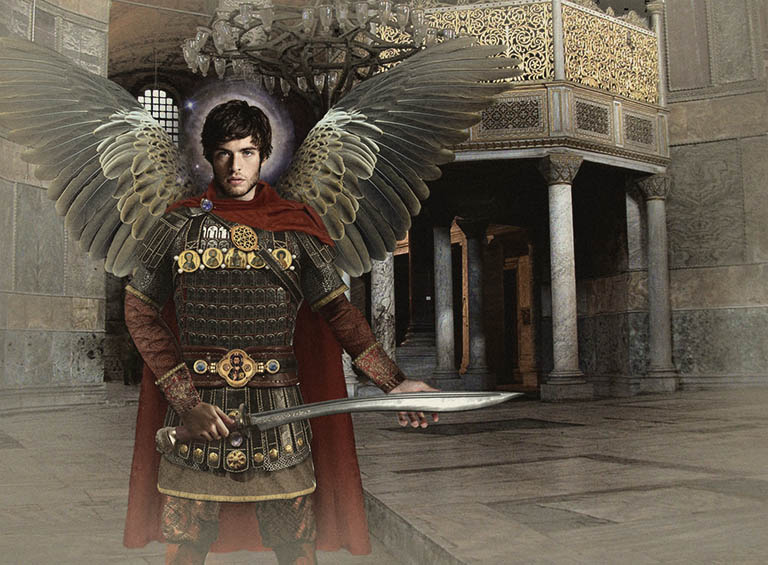 The brilliant August sun lit up for them a melancholy spectacle, as the Emperor—John had been left to amuse himself in Asia—and his wife and sisters rode or drove down the Mese to the cathedral. The Blachernæ palace itself was uninhabitable. Its mosaic walls were blackened with the smoke of the fires by which Latin soldiers had roasted their game, and its tessellated floors were in a sordid condition. Filthy, too, were the colonnaded streets and squares that had once been the pride of Constantinople. I will presume that the reader knows something of the indescribable ways of our Latin and Teutonic fathers at that time, and for centuries afterwards. Not a statue or ornament of value remained in the public squares; the vast piles of stone still lay where once had been the graceful mansions of the Byzantine nobility; and great areas of the city were now but scorched skeletons of once gay and populous districts. The Bucoleon palace alone had been preserved with any care, and to it, cleansed for their reception, the royal party proceeded, after a thanksgiving service in St Sophia.
The brilliant August sun lit up for them a melancholy spectacle, as the Emperor—John had been left to amuse himself in Asia—and his wife and sisters rode or drove down the Mese to the cathedral. The Blachernæ palace itself was uninhabitable. Its mosaic walls were blackened with the smoke of the fires by which Latin soldiers had roasted their game, and its tessellated floors were in a sordid condition. Filthy, too, were the colonnaded streets and squares that had once been the pride of Constantinople. I will presume that the reader knows something of the indescribable ways of our Latin and Teutonic fathers at that time, and for centuries afterwards. Not a statue or ornament of value remained in the public squares; the vast piles of stone still lay where once had been the graceful mansions of the Byzantine nobility; and great areas of the city were now but scorched skeletons of once gay and populous districts. The Bucoleon palace alone had been preserved with any care, and to it, cleansed for their reception, the royal party proceeded, after a thanksgiving service in St Sophia.
Before long the Court stealthily discussed the fate of the young Emperor who had been left at Nymphæum. Michael was said to have reflected that he had now obtained an Empire of his own, and that the obligation of his oath did not extend to this new dominion. Eulogia, a fanatically religious woman, as we shall see, supported her brother; indeed, it is said that the two nun sisters, whom Michael consulted daily, urged him to depose John and bury him in a monastery. Sinister268 rumours circulated in Constantinople, especially when Michael proceeded to marry John’s sisters to obscure Western nobles, who happened to be in the city, and gave them money enough to take their brides away to their distant countries. But this topic was presently displaced for a time by one of greater interest. It was said that Michael proposed to divorce the plain and quiet Theodora, and marry the Italian widow of John Vatatzes.
Anna had remained in the East after the death of her husband in 1254, and would be about twenty years old, or in the ripest development of her beauty, at the time we have reached. She came to Constantinople with the Court, and, from his slender resources, the Emperor supplied her with a revenue which enabled her to live and dress luxuriously. It was, no doubt, politic for Michael to invite the favour of the Italian monarch by this generous treatment of his sister, but Anna soon learned that the policy was strongly supported by inclination. Directly, or by means of his servants, Michael made violent love to her, and begged a fitting return for his liberality. Anna refused to be his mistress. It is characteristic that the chroniclers do not represent her as spurning his advances on the ground of virtue; she was, they say, too conscious of her superior origin to enter into such a relation with Michael, and, instead of rejecting his gifts and returning to her father’s Court, she let Michael know that, though she disdained the position of mistress, she would not refuse that of wife. The kindly and patriotic chronicler would have us believe that this was merely a ruse to protect her dignity, and we may or may not believe this. The immediate effect was that Michael began openly to speak of divorcing Theodora. She was, he gracefully acknowledged, a faithful wife and excellent woman, but considerations of State made it advisable for him to marry Anna. There was a fear that the Latins would make an effort to retake the city, and it was prudent to form an alliance with some of their strongest princes. Theodora, who269 had given birth to her fourth son since they had reached Constantinople, vehemently protested against the proposal and enlisted the interest of the patriarch, so that Michael was forced to send back Anna, with a splendid escort and equipment, to plead his cause in Italy.
Michael now returned to the problem of John, and, when he remarked to his courtiers that it was absurd to have “two heads under one hat,” they knew that the youth was doomed. We have no reason to doubt the statement of the chronicler that Eulogia supported him in this design, but we may at least assume that the manner of executing it was due to Michael alone. He ordered that the harmless and helpless young man should be blinded. A long experience had made the Greeks ingenious in this operation, and, instead of removing the eyes with knives, or using hot irons, they now sometimes blinded a man by an elaborate concentration of intense light on the retina or by the use of boiling vinegar. The more humane method of blinding by an intense light was used in the case of John, and the unfortunate youth was then incarcerated for life in a fortress on the coast of Bithynia. This ghastly operation was performed on the day on which the churches and monasteries of the Byzantine Empire offered their clouds of incense in honour of the birth of Christ. It is at least gratifying to find that it did not pass without protest. A warm-hearted youth attached to the Court lost his nose and lips for speaking too freely about it, and many others had to be punished.
Theodora seems to have been a silent, perhaps disgusted, witness of her husband’s course, and there is some faint evidence that Michael’s elder sister dissented from it. In fact, the patriarch Arsenius himself openly resented this flagrant violation of a thrice-repeated oath, and thus led to a long and fierce ecclesiastical struggle in which the two royal nuns were actively engaged. The patriarch’s procedure was not as emphatic and thorough as it ought to have been, but he at least distinguished270 himself among the crowd of corrupt and servile bishops and abbots by more or less excommunicating Michael. A council of bishops then obliged the Emperor by deposing Arsenius and putting a more courtly prelate in his place, but the hostility and derision of the people soon induced Germanus to retire, and a clerical diplomatist named Joseph occupied the see. As the furious schism of the Arsenians and the Josephites, which followed, will cross the lines of our story for some time to come, it is necessary to introduce this fragment of ecclesiastical history. For the moment it is enough to say that in 1268 the patriarch Joseph absolved from his sin the ostentatiously penitent Emperor, before a crowd of weeping Senators and priests.
The twenty years that followed the return to Constantinople were absorbed in the work of restoring the Empire and adjusting the quarrels of the partisans of the rival patriarchs. Of the restoration it is enough to say that, as in all similar efforts during the last three centuries of the Empire, it consisted in recovering the revenue of the Court and enriching the Emperor’s supporters, not in any serious attempt to revive the industries and commerce of the Empire.34 Nor were Michael’s attempts to make foreign alliances much more successful. Foiled in his efforts to secure the interest of Latin rulers, he turned to the Servians and Bulgarians. In 1272 he decided that his second daughter, Anna, should marry the King of Servia. Theodora had some misgiving that the barbaric Servians were unfit to receive her daughter, and she directed the ministers who took Anna to the frontier to send on in advance a party to explore the Servian Court, and to linger sufficiently on the journey to receive their report. It proved a wise precaution. The Servians had gathered round the advance party like—as271 described in the Byzantine chronicles—a group of savages. Anna’s eunuchs excited their intense curiosity, though not their admiration, and the superb equipment of the princess was heatedly criticized. They brought out Anna’s prospective mother-in-law, a dirty and coarsely dressed woman, to show the Greeks a model queen. They also stole the imperial horses. So the advance party hastily sent a report to the ministers who lingered on the way with Anna and she was conducted back to her mother.
In the same year Eulogia’s daughter Maria was married to the King of Bulgaria, but the marriage brought little profit to the Emperor. Eulogia had now quarrelled with Michael. She took the part of the ex-patriarch Germanus, and she and her daughters and her favourite monks threw themselves so ardently into the religious quarrel, which the Emperor vainly endeavoured to settle, that Michael was very angry with them. Monks now travelled constantly between the young Queen of Bulgaria and the Empress-nun, her mother, and gravely disturbed Michael’s work. After a time Maria sent some of the monks to Palestine to induce the Sultan to harass her uncle’s territory, and she even persuaded her husband to declare war on him. Michael hated the monks as heartily as Eulogia loved them, and he at length expelled his sister from the capital. When he went on to propose a union of the Latin and Greek Churches, and induced a synod at Constantinople to acknowledge the supremacy of the Pope, Eulogia’s love was turned into violent hatred of the Emperor.
Martha seems to have died during the struggle, and Theodora was too weak, or too indifferent to clerical matters, to take any part in it. She must have watched with disdain the last vain efforts of her unscrupulous husband to escape the dangers which threatened him. In the early winter of that year (1282) he set out to crush a rebellious noble of the Ducas family. Theodora tried in vain to dissuade him from leading an expedition to Thrace in such a bad season, and a month later she received the news of his death.
Her son Andronicus now took the purple, and, as Andronicus was orthodox and his royal aunt Eulogia at once returned to the scene, Theodora had a more dreary time than ever. Her brother was damned, Eulogia insisted, and his remains and memory were not to be honoured by the pompous ceremonies of the Greek Church. The young monarch—he was in his twenty-fifth year—bent to her commands, and the body of Michael was buried, almost without a prayer, in the military camp where he had died. Theodora feebly protested, and was assured by the fanatical Eulogia that her own soul was in danger, and her name could not be included in the list of those who were commended to the prayers of the faithful in St Sophia until she had purged herself of her guilt. She was compelled to sign a repudiation of the authority of the Pope, which would cost her little, and to promise that she would not ask the prayers of the Church for her husband.
Into the appalling struggle of the Church factions which followed we need not enter. One of the best historians of the time, who saw the Empire slowly perishing while its whole soul was absorbed in this quarrel, bitterly observes that “for the sake of a single coin both sides were prepared to take oaths so horrible that the pen cannot describe them.” One day they appealed to miracle; each side wrote out a statement of its case, and a vast crowd gathered to see the two rolls of parchment cast into the flames and howl for the intervention of God in favour of the just cause. But both documents were burned to ashes, and the ferocious struggle continued for decades, while the Turks spread over the Asiatic provinces, pirates swarmed in all the seas, and the Venetians and Genoese captured all the trade of the Empire. Eulogia disappears in the midst of this struggle, fighting to the last in the cause of the273 monks, a pathetic example of the way in which the age perverted its ablest and most spirited women.
Theodora lived on for twenty-two years, and saw two new Empresses enter the palace, but the chroniclers of the time are too much occupied with the ecclesiastical controversy to tell us much of the personal life of the Court. George Pachymeres has left us a large volume on the history of his times, but fully one-half of it is taken up with the patriarchal struggle. I will therefore be content to tell the later sufferings of Theodora, and then return to the Empresses whom her son Andronicus put on the throne.
The family of the Emperor Michael had consisted of four sons, three daughters and two illegitimate daughters. The daughters were bestowed upon various nobles or petty monarchs, and of the four sons three survived to intrigue, or suspect each other of intriguing, for the throne. Andronicus was the eldest, and he succeeded his father without opposition. The second son, Constantine, had, however, been the favourite of his parents; he had received great wealth from Michael, and it was known that Michael intended, when death closed his career, to set up Constantine as an independent Emperor in Greek territory. From the first, therefore, Andronicus regarded his younger brother with a jealous eye. Constantine was a good-looking and very popular youth, very liberal with his money and surrounded by friends. Unfortunately he had, like most of the Greeks of the time, little or no self-control, and in 1291 he gave his brother an opportunity to destroy him.
Some short time before 1291 Constantine had married the daughter of Raul, one of the chief officials of the Court. She was a beautiful and somewhat vain young woman, very conscious of her new dignity. On the Feast of the Apostles, one of the many days on which the ladies of Constantinople were wont to pay ceremonious visits to the ruling Empress, Constantine’s wife—we do not know her name—repaired in great splendour to the palace of Irene. In the hall sat an aged and noble dame named Strategopulina: in other words, a lady of the distinguished Strategopulos family, and herself a niece of a former Emperor. She had arrived too early for the reception, and sat on a couch without the Empress’s chamber. On account of her age and rank Strategopulina did not rise, as she ought to have done, when Constantine’s wife passed, and the offended princess returned to her husband in such rage that she fell ill. Most probably the old lady knew that Andronicus and his wife would not be very displeased with her action. But Constantine, egged on by his wife, took the matter in his own hands. Acquainted as we are with the morals of Constantinople, we are hardly surprised to learn that Strategopulina was believed, in spite of her age, to be intimate with one of her servants. Constantine sent some of his servants to flog this man in public, and drag him naked round the Forum.
The scandal, the storm of chatter, and the gross injury to one of his wife’s friends, angered Andronicus, and for some time he looked darkly on his brother. Constantine was alarmed, and took pains to conciliate him, but he was displaced from his position at Court and sent on some mission to Nymphæum.
With his sixty thousand gold pieces a year and his pretty wife Constantine would still find life desirable in Asia Minor. Presently, however, Andronicus came to Nymphæum, and took up his residence in the old palace of the Nicene Emperors. To this palace Constantine was summoned one morning in March (1291). He found it full of soldiers, learned that his brother had found him guilty of treason, and was given into custody. His luxurious belongings and his great income were confiscated by Andronicus, and he was destined to spend the remaining fifteen years of his life in a new and particularly ignominious prison. Andronicus was afraid to lodge him in a fixed jail, lest his supporters should free him and start a revolt, and he therefore had a portable275 prison—a litter converted into a strong-barred cage—made for him.
 In this plight Theodora found her handsome son when, a month of two later, Andronicus brought him to Constantinople. The Emperor had now taken a decisive step, and he disregarded his mother’s prayers and tears. When she pleaded that her son had been convicted, without trial, on the secret denunciation of a monk, Andronicus merely summoned a council in the palace and compelled his obsequious courtiers to ratify his sentence. Theodora continued to assail him, but she had never had much influence in the administration, and under Andronicus she was completely powerless. Andronicus gave her no opportunity to thwart his policy by intrigue or violence. When he was compelled to go into the provinces, he took Constantine with him in his portable prison, and the miserable young prince, dressed and shaven as a monk, dragged out year after year without the least prospect of escape. The third and youngest brother, Theodore, took warning by Constantine’s fate, put off all signs of royal estate, and, living as a private citizen, endeavoured to disarm the jealousy of the Emperor. These misfortunes, and the thick gathering of clouds about the Empire, saddened the last years of Theodora’s long life. The regaining of Constantinople had put no new spirit, no healthier blood, into either people or Court. The Byzantine power was doomed, and the last sad glances of the aged Empress fell on a capital fiercely rent with ecclesiastical quarrels, a shrunken Empire trodden under the feet of the Turk, and a sea swept by innumerable pirates. She died in 1304, respected and superbly lamented by the citizens of Constantinople. Without strength of character to make her mark on the life of the Empire during nearly fifty years of imperial authority, she had at least kept her slender record unstained by crime or vice in a criminal and vicious world. At the most we can regret only that she clung so faithfully to Michael Paleologus through all the crimes and deceits of his tortuous career.
In this plight Theodora found her handsome son when, a month of two later, Andronicus brought him to Constantinople. The Emperor had now taken a decisive step, and he disregarded his mother’s prayers and tears. When she pleaded that her son had been convicted, without trial, on the secret denunciation of a monk, Andronicus merely summoned a council in the palace and compelled his obsequious courtiers to ratify his sentence. Theodora continued to assail him, but she had never had much influence in the administration, and under Andronicus she was completely powerless. Andronicus gave her no opportunity to thwart his policy by intrigue or violence. When he was compelled to go into the provinces, he took Constantine with him in his portable prison, and the miserable young prince, dressed and shaven as a monk, dragged out year after year without the least prospect of escape. The third and youngest brother, Theodore, took warning by Constantine’s fate, put off all signs of royal estate, and, living as a private citizen, endeavoured to disarm the jealousy of the Emperor. These misfortunes, and the thick gathering of clouds about the Empire, saddened the last years of Theodora’s long life. The regaining of Constantinople had put no new spirit, no healthier blood, into either people or Court. The Byzantine power was doomed, and the last sad glances of the aged Empress fell on a capital fiercely rent with ecclesiastical quarrels, a shrunken Empire trodden under the feet of the Turk, and a sea swept by innumerable pirates. She died in 1304, respected and superbly lamented by the citizens of Constantinople. Without strength of character to make her mark on the life of the Empire during nearly fifty years of imperial authority, she had at least kept her slender record unstained by crime or vice in a criminal and vicious world. At the most we can regret only that she clung so faithfully to Michael Paleologus through all the crimes and deceits of his tortuous career.
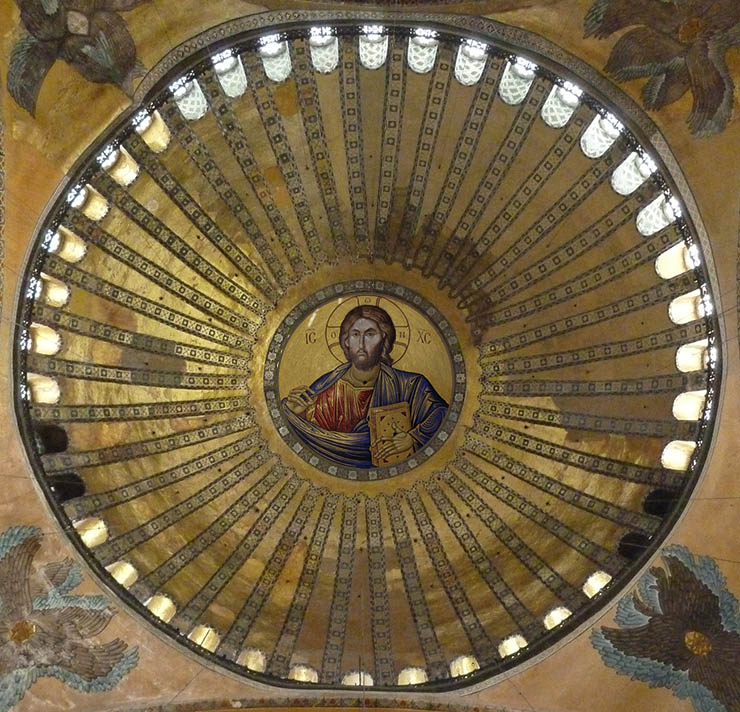
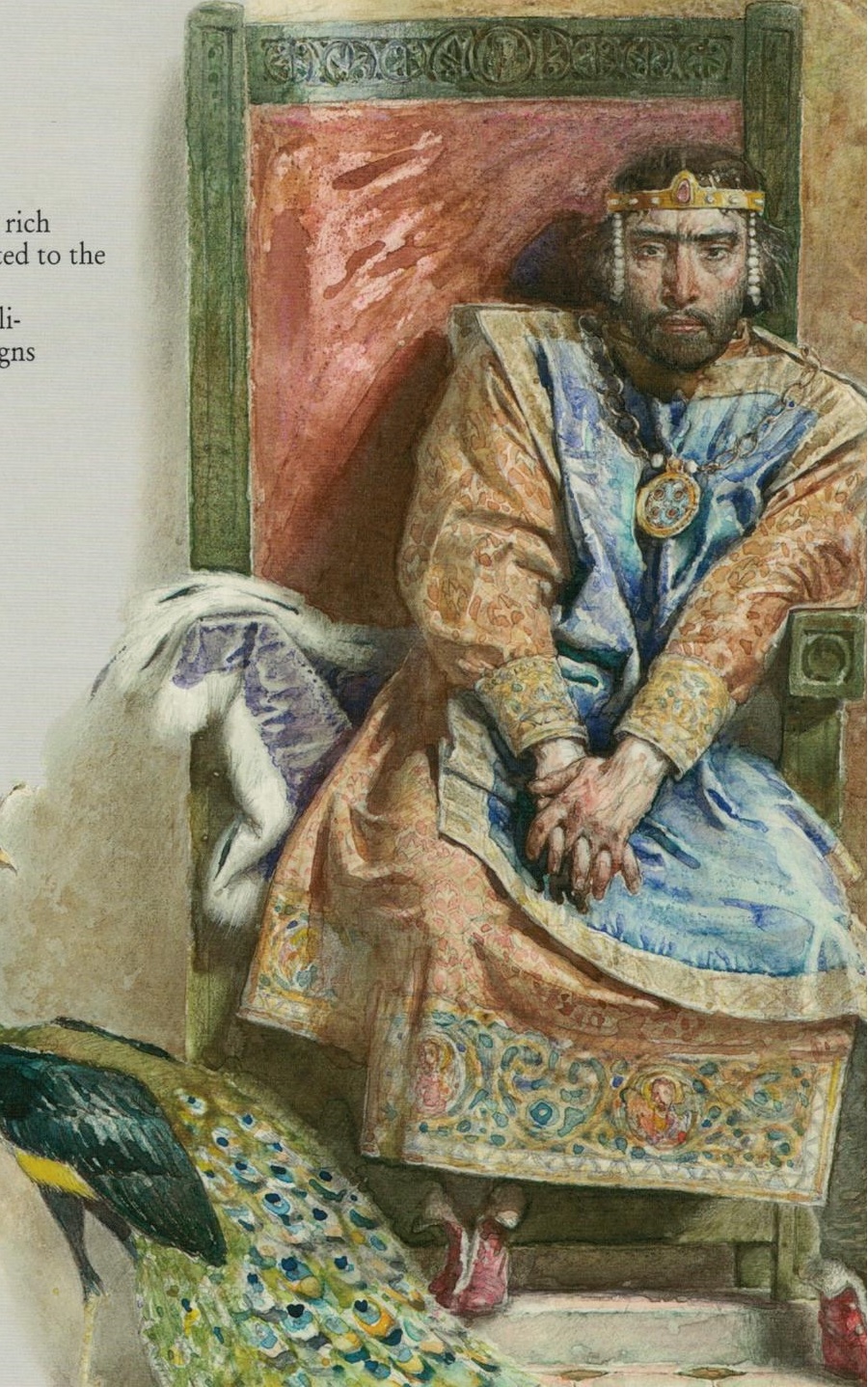 Emperor John I Tzimiskes, the murderer of his uncle Nikephorus II Phocas in his bed in the Boukoleon Palace. John married his uncle's wife, who was his co-conspirator in the assassination.
Emperor John I Tzimiskes, the murderer of his uncle Nikephorus II Phocas in his bed in the Boukoleon Palace. John married his uncle's wife, who was his co-conspirator in the assassination.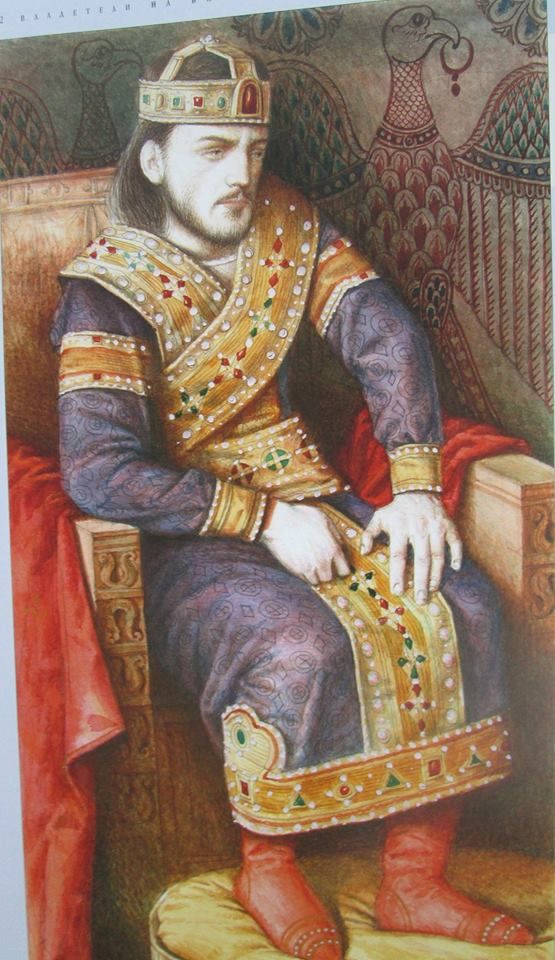
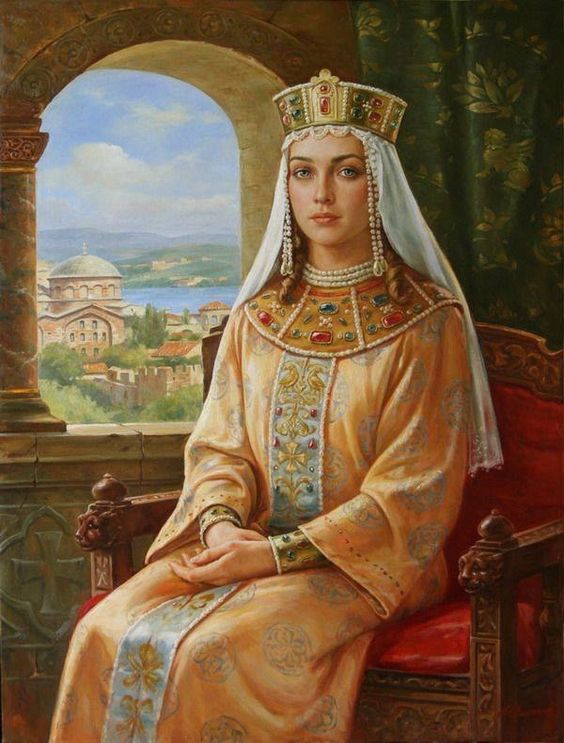
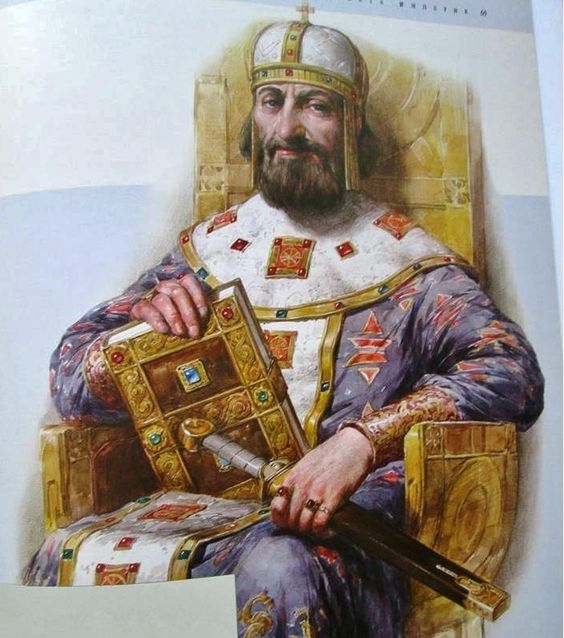
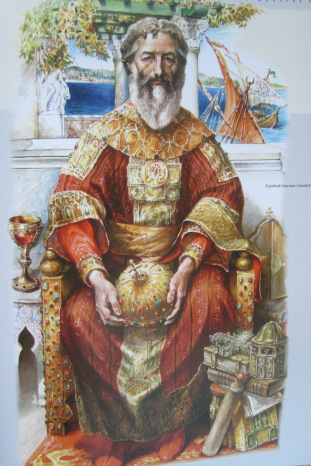
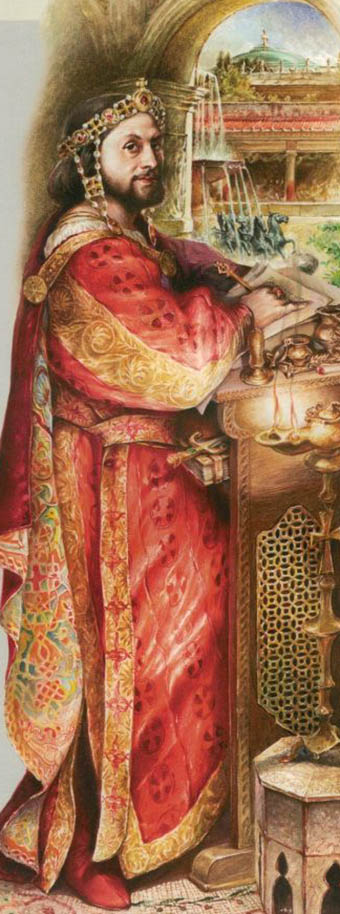
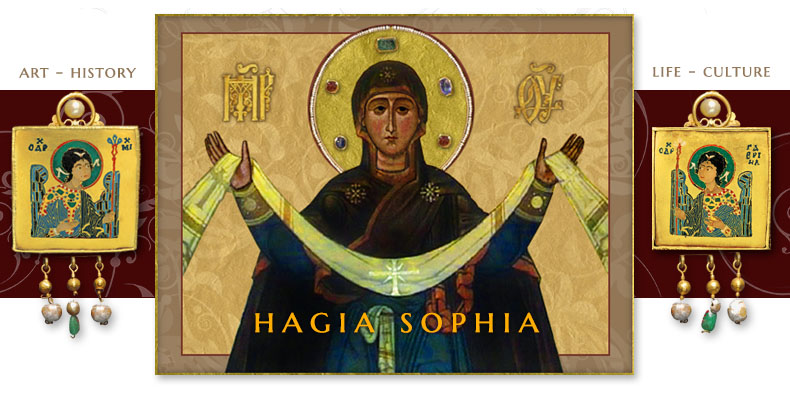
 For
For Baldwin himself was captured a few years later by the Bulgarians, and died in prison. His brother Henry, who succeeded him, married the daughter of Boniface, the King of Saloniki, whose adventures we have described. Agnes was, of course, not the daughter of the ex-Empress Maria, but of an earlier wife. She was summoned from Lombardy, married to Henry on 4th February 1207 in St Sophia, and the marriage day ended with a great banquet in the Bucoleon palace, in the older Byzantine fashion. But that is all we know of the Empress Agnes. Henry died in 1216, and his sister
Baldwin himself was captured a few years later by the Bulgarians, and died in prison. His brother Henry, who succeeded him, married the daughter of Boniface, the King of Saloniki, whose adventures we have described. Agnes was, of course, not the daughter of the ex-Empress Maria, but of an earlier wife. She was summoned from Lombardy, married to Henry on 4th February 1207 in St Sophia, and the marriage day ended with a great banquet in the Bucoleon palace, in the older Byzantine fashion. But that is all we know of the Empress Agnes. Henry died in 1216, and his sister This slight account of the Latin rule at Constantinople will suffice to enable us to follow intelligently the fortunes of the descendants of the Byzantine monarchs who had set up a throne at Nicæa. Theodore Lascaris had married Alexis’s daughter Anna, who died early in the reign of her husband, and her two successors in his affection are even less known to us than she. The first was Philippa, daughter of the King of Armenia; but, after giving birth to a boy, Philippa was, for some
This slight account of the Latin rule at Constantinople will suffice to enable us to follow intelligently the fortunes of the descendants of the Byzantine monarchs who had set up a throne at Nicæa. Theodore Lascaris had married Alexis’s daughter Anna, who died early in the reign of her husband, and her two successors in his affection are even less known to us than she. The first was Philippa, daughter of the King of Armenia; but, after giving birth to a boy, Philippa was, for some After nineteen years of this placid and useful co-operation with the Emperor, Irene passed away, and, after a decent interval of mourning, John Vatatzes, though now advanced in years, sought another Empress. He succeeded, in spite of the opposition of the papacy, in obtaining the hand of Anna, daughter of Frederick II., and sister of Manfred of Sicily. Anna was a pretty maiden of tender years, a mere symbol of alliance with the two powerful and independent monarchs I have named. John may have reflected that, as he had now entered his sixth decade of life, the immaturity of his bride would matter little. In the train of the young Empress, however, was an Italian marchioness whose eyes were, the chronicler says, “unescapable nets,” and John soon fell into them. Nicephorus says that the lady employed philtres and her fine Italian eyes in the conquest of the Emperor’s heart. We will be content to think that the eyes sufficed.
After nineteen years of this placid and useful co-operation with the Emperor, Irene passed away, and, after a decent interval of mourning, John Vatatzes, though now advanced in years, sought another Empress. He succeeded, in spite of the opposition of the papacy, in obtaining the hand of Anna, daughter of Frederick II., and sister of Manfred of Sicily. Anna was a pretty maiden of tender years, a mere symbol of alliance with the two powerful and independent monarchs I have named. John may have reflected that, as he had now entered his sixth decade of life, the immaturity of his bride would matter little. In the train of the young Empress, however, was an Italian marchioness whose eyes were, the chronicler says, “unescapable nets,” and John soon fell into them. Nicephorus says that the lady employed philtres and her fine Italian eyes in the conquest of the Emperor’s heart. We will be content to think that the eyes sufficed. Such was the initiation to power and dignity of the Empress Theodora. Two other women, who will engage our attention, shared the elevation. These were Michael’s two sisters, Martha and Eulogia, who began to have an even more important voice than Theodora in the administration. Both of them were widows, and had, after the death of their husbands, assumed the monastic
Such was the initiation to power and dignity of the Empress Theodora. Two other women, who will engage our attention, shared the elevation. These were Michael’s two sisters, Martha and Eulogia, who began to have an even more important voice than Theodora in the administration. Both of them were widows, and had, after the death of their husbands, assumed the monastic The brilliant August sun lit up for them a melancholy spectacle, as the Emperor—John had been left to amuse himself in Asia—and his wife and sisters rode or drove down the Mese to the cathedral. The Blachernæ palace itself was uninhabitable. Its mosaic walls were blackened with the smoke of the fires by which Latin soldiers had roasted their game, and its tessellated floors were in a sordid condition. Filthy, too, were the colonnaded streets and squares that had once been the pride of Constantinople. I will presume that the reader knows something of the indescribable ways of our Latin and Teutonic fathers at that time, and for centuries afterwards. Not a statue or ornament of value remained in the public squares; the vast piles of stone still lay where once had been the graceful mansions of the Byzantine nobility; and great areas of the city were now but scorched skeletons of once gay and populous districts. The Bucoleon palace alone had been preserved with any care, and to it, cleansed for their reception, the royal party proceeded, after a thanksgiving service in St Sophia.
The brilliant August sun lit up for them a melancholy spectacle, as the Emperor—John had been left to amuse himself in Asia—and his wife and sisters rode or drove down the Mese to the cathedral. The Blachernæ palace itself was uninhabitable. Its mosaic walls were blackened with the smoke of the fires by which Latin soldiers had roasted their game, and its tessellated floors were in a sordid condition. Filthy, too, were the colonnaded streets and squares that had once been the pride of Constantinople. I will presume that the reader knows something of the indescribable ways of our Latin and Teutonic fathers at that time, and for centuries afterwards. Not a statue or ornament of value remained in the public squares; the vast piles of stone still lay where once had been the graceful mansions of the Byzantine nobility; and great areas of the city were now but scorched skeletons of once gay and populous districts. The Bucoleon palace alone had been preserved with any care, and to it, cleansed for their reception, the royal party proceeded, after a thanksgiving service in St Sophia. In this plight Theodora found her handsome son when, a month of two later, Andronicus brought him to Constantinople. The Emperor had now taken a decisive step, and he disregarded his mother’s prayers and tears. When she pleaded that her son had been convicted, without trial, on the secret denunciation of a monk, Andronicus merely summoned a council in the palace and compelled his obsequious courtiers to ratify his sentence. Theodora continued to assail him, but she had never had much influence in the administration, and under Andronicus she was completely powerless. Andronicus gave her no opportunity to thwart his policy by intrigue or violence. When he was compelled to go into the provinces, he took Constantine with him in his portable prison, and the miserable young prince, dressed and shaven as a monk, dragged out year after year without the least prospect of escape. The third and youngest brother, Theodore, took warning by Constantine’s fate, put off all signs of royal estate, and, living as a private citizen, endeavoured to disarm the jealousy of the Emperor. These misfortunes, and the thick gathering of clouds about the Empire, saddened the last years of Theodora’s long life. The regaining of Constantinople had put no new spirit, no healthier blood, into either people or Court. The Byzantine power was doomed, and the last sad glances of the aged Empress fell on a capital fiercely rent with ecclesiastical quarrels, a shrunken Empire trodden under the feet of the Turk, and a sea swept by innumerable pirates. She died in 1304, respected and superbly lamented by the citizens of Constantinople. Without strength of character to make her mark on the life of the Empire during nearly fifty years of imperial authority, she had at least kept her slender record unstained by crime or vice in a criminal and vicious world. At the most we can regret only that she clung so faithfully to Michael Paleologus through all the crimes and deceits of his tortuous career.
In this plight Theodora found her handsome son when, a month of two later, Andronicus brought him to Constantinople. The Emperor had now taken a decisive step, and he disregarded his mother’s prayers and tears. When she pleaded that her son had been convicted, without trial, on the secret denunciation of a monk, Andronicus merely summoned a council in the palace and compelled his obsequious courtiers to ratify his sentence. Theodora continued to assail him, but she had never had much influence in the administration, and under Andronicus she was completely powerless. Andronicus gave her no opportunity to thwart his policy by intrigue or violence. When he was compelled to go into the provinces, he took Constantine with him in his portable prison, and the miserable young prince, dressed and shaven as a monk, dragged out year after year without the least prospect of escape. The third and youngest brother, Theodore, took warning by Constantine’s fate, put off all signs of royal estate, and, living as a private citizen, endeavoured to disarm the jealousy of the Emperor. These misfortunes, and the thick gathering of clouds about the Empire, saddened the last years of Theodora’s long life. The regaining of Constantinople had put no new spirit, no healthier blood, into either people or Court. The Byzantine power was doomed, and the last sad glances of the aged Empress fell on a capital fiercely rent with ecclesiastical quarrels, a shrunken Empire trodden under the feet of the Turk, and a sea swept by innumerable pirates. She died in 1304, respected and superbly lamented by the citizens of Constantinople. Without strength of character to make her mark on the life of the Empire during nearly fifty years of imperial authority, she had at least kept her slender record unstained by crime or vice in a criminal and vicious world. At the most we can regret only that she clung so faithfully to Michael Paleologus through all the crimes and deceits of his tortuous career.


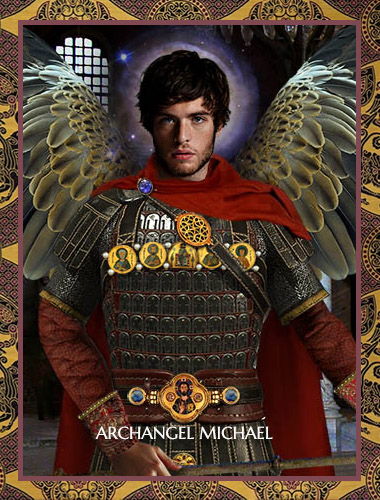

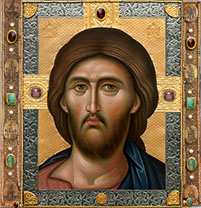 click here for icons of christ
click here for icons of christ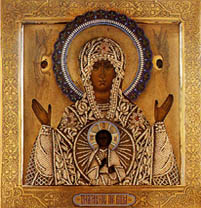 click here for icons of the theotokos
click here for icons of the theotokos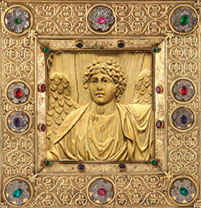 click here for icons of angels
click here for icons of angels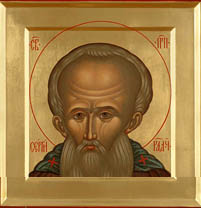 click here for icons of saints
click here for icons of saints








